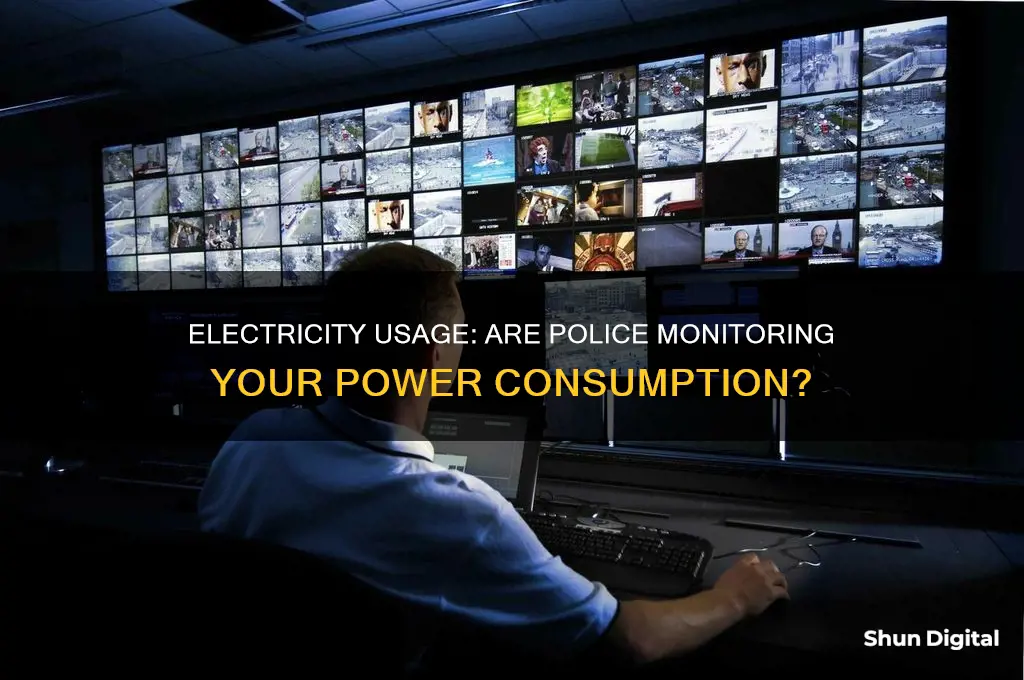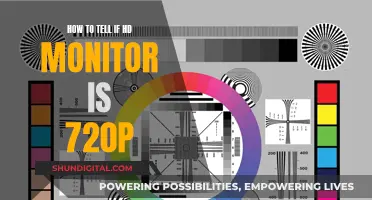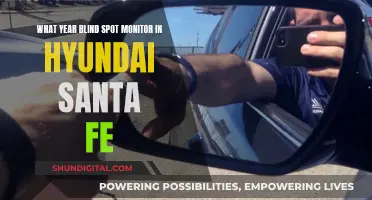
The police can access data on electricity usage, but they require a warrant to do so. In the United States, a federal judge has ruled that people with smart meters have a reasonable expectation of privacy, and law enforcement will need a warrant to access their data. This is because smart meters can reveal detailed information about a person's habits and movements. In Canada, electrical companies have been known to join task forces with the RCMP to monitor grow-ops. While it is rare, power companies have been known to notify the police of unusually high electricity usage, which can be a sign of illegal marijuana farming.
| Characteristics | Values |
|---|---|
| Do police monitor electricity usage? | Police do not directly monitor electricity usage. However, they can request data from utility companies with a warrant. |
| Utility companies sharing data with police | Utility companies may share data with police if they suspect illegal activity, such as marijuana farms. Some companies have stated that they do not report customers based on high energy usage alone. |
| Smart meters and privacy concerns | Smart meters collect detailed electricity usage data, raising privacy concerns. Courts have ruled that warrants are required for law enforcement to access smart meter data, as it can reveal intimate details about a person's life. |
| Legal considerations | Customers have a reasonable expectation of privacy regarding their electricity usage data. An earlier court decision stated that sharing data with a third party (such as the utility company) waives the right to privacy. However, higher courts have since ruled that data collection by the city itself constitutes a search, requiring a warrant. |
What You'll Learn

Police can access smart meter data with a warrant
Smart meters are increasingly being adopted by consumers, and while they bring many benefits, they also raise concerns about privacy. The data collected by these devices can reveal a lot about what goes on in a home. It can indicate whether someone is home, whether they're in the kitchen or the bedroom, and even whether they've recently opened the fridge. This data is collected and recorded centrally at very short intervals, perhaps every 15 minutes, and can be kept for years.
The question of whether law enforcement agencies can access this data without a warrant has been the subject of legal debate and court rulings. In the United States, the Fourth Amendment protects citizens against unreasonable searches and seizures, and the issue of data privacy is becoming increasingly important as technology advances.
In a case involving the city of Naperville, Illinois, which mandated the use of smart meters, a group of concerned citizens sued, arguing that the collection of their electricity consumption data without a warrant violated their Fourth Amendment rights. The case eventually reached the 7th Circuit Court of Appeals, which ruled that while the city could collect the data for administrative purposes without a warrant, a warrant would indeed be required if the data was to be used for a criminal investigation. This ruling set an important precedent for the protection of digital privacy.
In another case, a former state trooper in Ridgeville, South Carolina, was raided by deputies after his utility company, Edisto Electric, noticed unusually high electricity use and frequent circuit tripping on his rental property. This case sparked a debate about the role of utility companies in sharing customer information with law enforcement. While some argue that utility companies have a right to share information if they suspect illegal activity, others believe that customers have a reasonable expectation of privacy when it comes to their electricity usage data.
While there may be valid concerns about illegal activities such as marijuana cultivation, which often involves high electricity usage, law enforcement agencies must still respect citizens' privacy rights. The Supreme Court has ruled that a warrant is required to conduct a search based on suspected illegal activity uncovered through means such as thermal imaging. Similarly, smart meter data, which can reveal intimate details about a person's life, should be protected from warrantless searches.
Inns and Internet Privacy: What You Need to Know
You may want to see also

Power companies may share data with police
This incident sparked debates about the role of utility companies in law enforcement and the privacy rights of their customers. Some argue that utility companies should not act as an arm of law enforcement and share information without a warrant, while others defend the practice as a necessary tool to combat crime.
In the United States, the Electronic Communications Privacy Act (ECPA) governs how and when the government can access individuals' data. However, this law is several decades old and may not adequately address the complexities of modern data collection and sharing.
In the UK, the General Data Protection Regulation (GDPR) and the Data Protection Act 2018 (DPA 2018) allow for data sharing between private entities and law enforcement when it is deemed necessary and proportionate. This means that, in certain circumstances, power companies may be within their rights to share customer data with the police without explicit consent.
While there are valid concerns about privacy and the potential for abuse, data sharing between power companies and law enforcement can also aid in the detection and prevention of criminal activities. For example, by analyzing patterns and trends in electricity usage, law enforcement may be able to identify and disrupt illegal operations, such as marijuana grow houses.
Ultimately, the issue of data sharing between power companies and law enforcement is complex and requires a careful balance between public safety and individual privacy rights. Clear guidelines, oversight, and accountability measures are necessary to ensure that data sharing practices are fair, transparent, and respect the rights of citizens.
Monitoring Electricity Usage: A Guide to Tracking Your Power Consumption
You may want to see also

Police use of data varies by location
However, in Canada, electrical companies are known to join task forces with the RCMP to crack down on grow-ops. While citizens have a 48-hour window to clean up their grow op before inspection, electrical companies have computer programs that can detect power spikes and other unusual usage patterns.
In some locations, power companies have been known to notify the police of suspected marijuana farms based on high electricity usage. For example, in South Carolina, Edisto Electric called the police after noticing unusually high electricity use and numerous instances of tripping circuits on a property. This information was used to raid the property and discover a sophisticated indoor marijuana farm.
On the other hand, some power companies insist that they would not turn in customers based solely on high electricity bills. Spikes in power usage can often be caused by faulty heating systems, leaking ductwork, or other mundane issues. For example, a spokesman for South Carolina Electric and Gas stated that they do not report people to the authorities based on their electricity usage.
The use of data by police varies depending on local laws and practices, with some areas requiring warrants for certain types of data and others having more lenient privacy standards.
Monitoring WiFi Usage: Track, Analyze, and Optimize Your Network
You may want to see also

High electricity usage can indicate illegal activity
Electricity theft is a serious issue, and high electricity usage can sometimes be a sign of illegal activity. While most people legitimately consume electricity, some individuals or organizations may engage in electricity theft, which can have dangerous consequences for themselves and others.
One of the most common methods of electricity theft is tampering with meters to avoid recording usage. This can lead to an inaccurate reading, resulting in lower bills for the thief. However, it poses a risk to the safety of the thief, their neighbors, and operators working on electrical installations. The chances of electrical fires and overloads increase, potentially causing damage to appliances and the electrical system.
In some cases, high electricity usage can indicate illegal activity, such as marijuana cultivation. Indoor growers often require high-intensity lamps and climate-control equipment, resulting in excessive electrical consumption. Power companies have sometimes notified authorities when they suspect unusual activity based on high electricity usage. For example, in the case of a former state trooper in Ridgeville, high electricity usage and frequent circuit tripping led to the discovery of a marijuana farm.
While power companies generally respect customer privacy, they may share information with law enforcement if they suspect illegal activity. This collaboration can help address electricity theft and other criminal activities. However, it also raises concerns about privacy and the role of utility companies in law enforcement.
To address suspected electricity theft, it is recommended to notify the electric utility immediately. Additionally, individuals can take preventive measures, such as not tampering with their meter and ensuring a legal connection. By staying vigilant and reporting suspicious activities, we can help reduce the impact of electricity theft on both safety and utility costs.
Monitoring Bandwidth Usage: Strategies for Effective Network Management
You may want to see also

Smart meters collect detailed data on electricity usage
Smart meters are being rolled out across Great Britain to upgrade the energy system. They are convenient, efficient, and helpful to both customers and suppliers. These meters automatically send meter readings to suppliers, removing the need for manual meter readings.
The data collected by smart meters is limited to essential data about energy usage. It does not hold data that could be used to identify the customer, such as their name, address, or bank details. The data is also protected by UK data protection laws, which means that suppliers cannot give any third parties access to the data without the customer's consent.
Smart meters do not use the internet to send and receive information. Instead, they use their own secure communications network, similar to how mobile phones send and receive text messages. This wireless connection is designed by cybersecurity experts to be very secure and encrypted, preventing hackers from accessing the information.
Smart meters also offer customers an in-home display (IHD) device, which shows the customer how much energy they are using in near real-time. The IHD simply displays data from the smart meter and cannot record information. Customers can also access their data through third-party apps, but they must give the app permission to do so.
Electricity Usage Monitoring: What UK Energy Companies Can See
You may want to see also
Frequently asked questions
Police do not directly monitor electricity usage, but they may request data from utility companies if they suspect illegal activity. Smart meters, for example, collect detailed electricity usage data which can reveal a lot about a person's habits and activities in their home. As such, law enforcement requires a warrant to access this data.
Yes, high electricity bills can be used as a reason for the police to obtain a warrant. In some cases, utility companies have reported customers with high energy use, suspecting illegal activity.
No, law enforcement requires a warrant to access smart electrical meter data. This is because people with smart meters have a reasonable expectation of privacy regarding their electricity usage data.
While you cannot prevent the police from accessing your data with a warrant, you can take steps to reduce your electricity usage and maintain privacy in other areas of your life. This may include unplugging devices when not in use, switching to energy-efficient appliances, or using alternative sources of energy.







